Images of one of Fidel Castro’s grandsons bragging about the Mercedes Benz he toys around with are barely the tip of the iceberg vis a vis the family clan. The Castro’s have ruled the island for more than half a century as if it were their family farm. Although most of them have chosen a life away from politics, filled with leisure and glamour, like typical privileged children they feel part of the political power that their blood relation allows them insofar as circumventing norms, loyalties and even Miguel Diaz-Canel himself. who bears the misfortune of not being a Castro, much less part of the military caste that manipulates him from the shadows.
Alex Castro Soto del Valle, known as “Roberto Nabo Duro” on social media, who is the husband of Kenelma Carvajal, today’s vice minister of Culture, labeled his nephew Sandro as the rotten apple of the family. By doing so, he not only was attempting to make us forget his own lazy history as “bon vivant” (taking advantage of his closeness to his dictator father in order to pursue photography while staying close to the family mansion at Punto Cero, for example), but also, and what is more important: that the mantle of humility with which they have manipulated the impoverished masses does not come naturally to any of them.
Sandro’s case, and even his uncle Alex’s, are not the only ones, neither are they at the top of the pyramid of untouchables, in spite of the system’s hypocrisy they reveal. Theirs is a communist Olympus, where the families of Mariela and Alejandro Castro Espín, two of the four children of Raul Castro and Vilma Espin Guillois, have taken the place reserved before 2008 for Antonio Castro Soto del Valle with this playboy passions like golf and luxury cars, his questionable businesses with Italian Sandro Cristoforetti, his European vacations with the Hidalgo family, the owners of Globalia, and the scandal caused by his ex-girlfriend Dashiell Torralba in 2002 about life inside the mansion of Fidel Castro and Dalia Soto del Valle.

There’s lots of talk about Fidel Castro’s sons and grandchildren, but only a few more facts are known. They are credited with several bar and restaurant businesses in Havana, and Tony and Sandro’s social media is followed closely, as are those of other members of the lesser known side of the Castro family that moved to Miami following the decline and eventual demise of Fidel Castro –as if they anticipated some sort of retaliation within the clan- but little is said about Raul Castro’s descendants and their private life is seldom revealed to the public.
Maybe the publicity disproportion is intentional, even provoked from within the inner circle of the Castro clan, in their attempt to focus attention on less damaging revelations (Sandro and his antics, for example). It would seem to be about exposing those heads that public opinion already chopped off and not the heads that are still holding steady on the shoulders of other relatives, due to how little we know about them.
While the public becomes incensed with the images of Sandro on his Mercedes Benz, or of the younger Tony sunbathing on the French Riviera, no one notices that other grandchildren –not Fidel’s but Raul’s- enjoy better “toys” at home, as owners of possibly a greater fortune.
That would be the case of the young economics student Paolo Titolo Castro, aka “Paolito”, the son born of the marriage between Mariela Castro Espin and Italian Paolo Titolo. This pater familias isn’t merely a photographer in the style of Alex Castro, but one of the most important foreign businessmen in the island. Titolo is the general director of AMORIM Negocios Internacionales S.A., the Cuban company that represents the Amorim Group, a European company whose owners have been regarded by Forbes as the largest fortune in Portugal, linked to several fraud, corruption and money-laundering scandals, among them the scandals involving Isabel dos Santos, the richest woman in Africa, daughter of Angolan president –and a friend of the Castros- Jose Eduardo dos Santos.
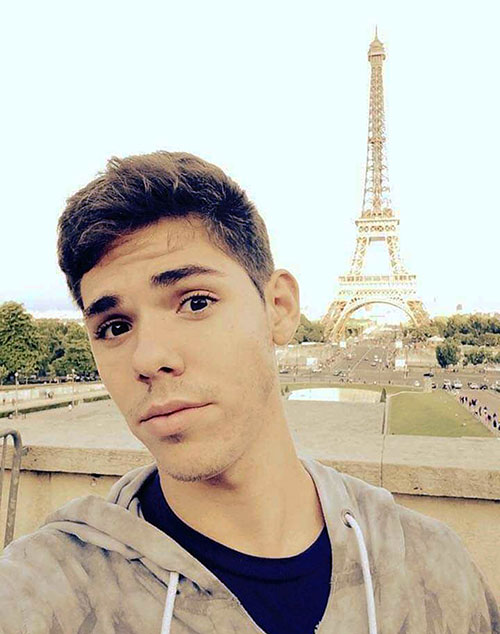
Together with Paolito Titolo, who spends practically every Christmas with his Italian family either in Palermo or in Paris -coinciding with Mariela and Paolo’s wedding anniversary- cousins Raul Alejandro and Fidel Ernesto Castro Calis celebrate with him. Raul Alejandro and Fidel Ernesto are the two sons of Alejandro Castro Espin by his first wife, Marietta Calis Lauzurica, whom he married just after graduation from the military academy at the age of 25.
Who are the grandsons of Raul Castro and what do they do
Raul Castro has more than three grandsons, but Paolo, Raul Alejandro and Fidel Ernesto are the ones that most enjoy going to discotheques, vacationing at their beach houses, and partying with their university friends. They love to show that they are a lot of fun and as “normal” as the next guy, although how often they engage
in leisurely activity makes them forget that their daily lives are considered a luxury by any Cuban individual, including doctors, engineers, lawyers and even artists, whose miserable salaries and plebeian living conditions to not allow them to lead “normal lives”.
And speaking of privileges and artists, this would be the best moment to remember that Edith Massola, host of the 23 y M program on Cuban television, was Paolito Titolo Castro’s mother-in-law, something that, according to people close to the family, did not please his mother Mariela. Mariela has been grooming the young man to succeed her husband in managing Grupo Amorim’s businesses in Cuba. This was the reason behind Paolito registering for a career in Economics at the University of Havana, and his initiation in the company’s affairs.

Paolito himself announced his engagement to Edith Massola’s daughter in one of his Facebook pages. Mother-in-law, sister-in-law and fiancée react often to the young Castro’s posts, just like him and his cousins Tony, Raul and Fidel Ernesto –always having fun together- have posted “likes” to Edith’s posts, as well as to Paula Massola’s posts. Paula is the “pretty woman’ that some time ago caused a scandal on social media when, in the middle of the pandemic-related ban on accessing the beaches, she posted a video on internet boasting about her prerogatives for being “a general’s friend”.
We can infer from this “sentimental” relationship between the Castros and the Massolas that Paola wasn’t talking about just any general who authorized her to violate the quarantine. She was referring to the general of all generals in Cuba: “grandpa” Castro, who today is no longer in public life but is not far away from the real power. She could have been referring, also, to “daddy” general at the Ministry of the Interior who has inherited the whip with which he names and removes high-ranking officials as he pleases.
Alejandro Castro Espin, alias “One-Eyed Alex”, is the most feared military officer in Cuba. His power has no limits due to his sinister role in the island’s intelligence and counterintelligence services. He was present in every conversation during the process of rapprochement with the United States. But what’s more important, his recordings of conversations and text messages between former foreign minister Felipe Perez Roque, former vice president Carlos Lage Davila and Carlos Valenciaga, Fidel Castro’s former chief of staff, caused not only their demise but also the demise of anyone associated with his once-powerful uncle’s “support group”.
Alejandro Castro Espin’s persistent espionage labor from an obscure department at MININT guaranteed for his father Raul in 2009 an unencumbered inheritance that was clear and unhindered, with offices and desks at the Council of State and at the most important ministries vacated in order for Raul to designate his military faithful under the leadership of Luis Alberto Rodriguez Lopez-Calleja (Raul Guillermo Rodriguez Castro’s son from his marriage to Deborah Castro Espin). Raul had been grooming this military caste patiently to get them ready for a virtual takeover, which enabled them to take control of the economy in under five years.

Raul Alejandro, Fidel Ernesto Castro Calis and Paolo Titolo Castro, together with Raul Guillermo, are the favorite grandsons of the Castro dynasty; The “unfortunate” Sandro and Tony no longer enjoy the privilege. The first two resemble their paternal grandfather greatly. Paolito, however, is the spitting image of his mother Mariela. Both Raul Alejandro and Fidel Ernesto graduated from the university recently.
These two young men, with their mother Marietta and their cousin Beatriz “Betty” Dorta Calis, enjoy vacationing together as well as weekends in hotels or at the Castros’ summer house in Varadero. Up to now, their photographs have been accessible on their Facebook profiles.
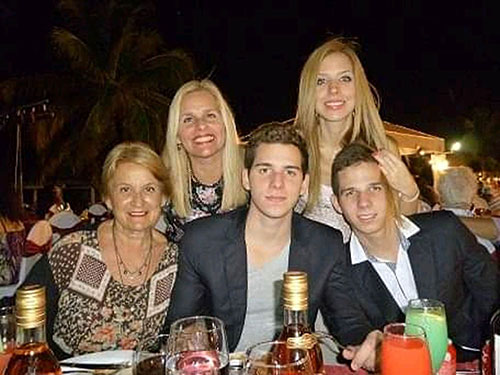
Betty Dorta is another actor in a family that has plenty of them. She is a cousin of Raul Castro’s grandsons by way of Marietta Calis. Taking data from her CV, she joined La Colmena theatre company when she was five years old, and at 13 she was already a child model for a Lybian company. When she was 15, her mother took her to live in England, and upon their return to Cuba, she registered at the National Art School to study acting, a profession that comes natural to the Castros and their acquaintances.
Today, she is listed as run-of-the-mille actor in the Teatro El Publico theatre company in Havana, and she has modeled as part of publicity campaigns for [the Spanish hotel chain] Melia and Excelencias del Caribe magazine, and has appeared in assorted video clips.
For her part, Marietta Calis likes to post frequently on her Facebook page about trips and family celebrations. She also uses that space to promote her incipient fruit marmalade business; she makes the marmalade in her leisure time, perhaps taking advantage of her well-supplied pantry, unlike those in the homes of average Cubans. She sells the jars, branded with the “Mermeladas Mary” label, among her friends at a price that oscillates between 100 and 200 Cuban pesos. She pays no [self-employment] business license fee.

However, “it’s not a business as such, it’s only a hobby,” explains Marietta to her circle so as to avoid malicious comments. She could be right. Her present husband, Manuel Melian Perez Rolo, was an official at the Ministry of Tourism, and now, as an employee of the state marketing company Artex, he could be making enough money to afford them celebrating Christmas 2019 in Varadero, and Christmas 2020 hopping from one restaurant to another in Old Havana.
Paolito, Paolo Titolo and Mariela Castro, the most “fortunate”
Paolito Titolo is “a spoiled and restless brat”, “boastful and arrogant”. That’s what those who know him well say, friends from the School of Economics who have shared with him the night life he so enjoys when he is not traveling throughout Italy with his favorite cousins, especially with Giorgia, daughter of Dario Titolo, the younger brother of Mariela Castro’s husband.
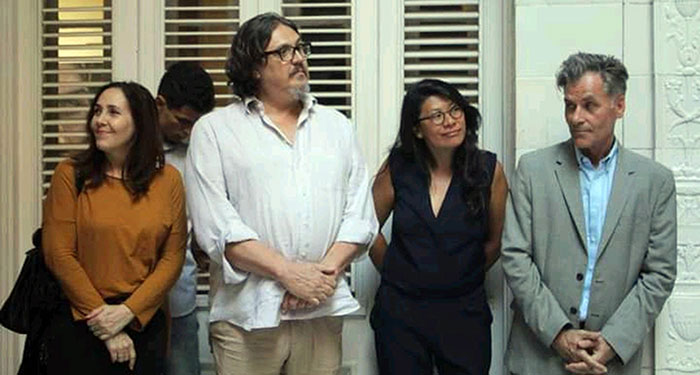
He likes Porto del Sole in Italy. In fact, the photograph he has posted on one of his Facebook accounts since 2018 was taken during the Christmas holidays he spent there, facing the Mediterranean where he loves to go sailing with his paternal grandfather, Isidoro, or with the Gagliano family that pampers him plenty.
Cuba, however, is an obligation that destiny has in store for him for being a Castro. Cuba is not a country like Italy, but a company that belongs to him, whose management awaits him in the shadows. A business-country that no one who is far removed from the Castro clan can inherit, for they would risk dangerous scrutiny of a family fortune whose true magnitude few people know.
Havana is a boring city, but it can become interesting on occasional nights when there is alcohol, cigars and plenty of young women just waiting for free drinks. First, Casa de la Musica, in Miramar or the Sangri-La Bar, to get started. After, the party will go on until dawn at the Saltzucar Bar, where the cost of a VIP table is more than US$300.
Prices are not an obstacle for the son of Mariela and Paolo. For one to be half Castro and half foreigner places him beyond good and evil, and makes lots of things easier, like in the girls’ department. He doesn’t share too much on social media about his binges, and his parents don’t engage very much on the few details he uploads. But, every so often, he’s careless with an image or an indiscrete comment as a result of how much alcohol he has consumed. And that’s when the scolding begins.

He’s been forbidden from doing so. Maybe even his uncle, Fidel Antonio Castro, advisor to the dean of the Information Sciences University, has talked to him about the dangers of posting on social media. He himself has requested from his close friends –among them the grandson of Jose Ramon Machado Ventura, Ernestico Machado Briñis, alias “The Egg”, whom he loves dearly- not to tag him on their posts so as not to call the attention of nosey people, of “gusanos” [worms: Cubans who are against the revolution], of “garrapatillas” [ticks, insects] –what Mariela calls them- as has happened with Machadito’s posts as well as Sandro’s (“the rotten apple”) and with Tony’s (“the model”) who at times have gone out on the town with Paolo.
Although the same blood runs in their veins, and although they own two or three restaurants in Old Havana and rental properties in the capital city, Sandro and Tony will never be as fortunate as Paolo Titolo Castro will be when the time comes to relieve his father. In reality, for almost 20 years, the Italian has lent his name to a business that has always belonged to the Castros.
At first, it belonged to Fidel, who was a good friend of Americo Amorim since the early 1980s; and then Raul inherited it. Raul saw the marriage of Mariela to the Italian (a union that was consolidated by the birth of a grandson) as the opportunity to guarantee for himself a valued part of his brother’s patrimony. Raul convinced Fidel to place Paolo Titolo at the head of Grupo Amorim’s businesses in Cuba, replacing Jose Guimaraes, the Portuguese head of the company who had occupied that position starting in the 1980s until 2004. Raul thought it was dangerous to the Castros to place such trust in someone outside the family.
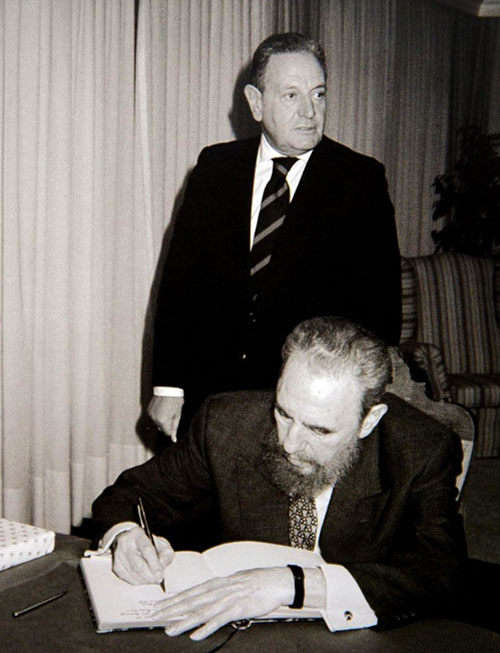
Americo Amorim, Fidel, Raul, Paolo Titolo, and even Isabel dos Santos
In January of 2020, the International Consortium of Investigative Journalists (ICIJ) gained access to 715,000 documents known as the “Luanda Leaks”, perhaps the biggest corruption scandal in Africa to date. It revealed that Isabel dos Santos, daughter of Angolan president Jose Eduardo dos Santos, owned the largest fortune in the African continent, a good portion of it developed with the help of U.S. companies, and always in complicity with International Credit Bank with participation from Amorim Group in Portugal, which had been accused by several media sources of money-laundering millions of Euros.
According to a January 2020 article published in The New York Times, the so-called “African princess” amassed that entire fortune through decrees signed by her father in his capacity as president of the nation.
Jose Eduardo dos Santos, like Fidel and Raul Castro, was a very good friend of Americo Amorim. Amorim, in turn, enjoyed the friendship of every head of state in the former socialist bloc in Eastern Europe, especially the Soviets, who had helped him in the 1970s when the agrarian reform enforced by the Portuguese government had confiscated Amorim’s cork-oat fields that had made him the leader in the world’s cork market.
The shrewd businessman not only launched a contraband operation involving lumber and products manufactured with the communists, but also set fire to the timber forests prior to confiscation, which enabled him to file a claim with the insurance company.
Shortly thereafter, he negotiated with Fidel Castro, through the Soviets, to install an informal, quasi-clandestine office in Havana for the lumber business. Later, he added other areas of interest, equally covert, like the import and export of fossil fuel –after the year 2000 and possibly through some type of deal with Venezuela- and tourism. This agreement, according to Portugal’s minister of tourism, was only made official on paper in May 2017 during Ana Mendes Godinho’s visit to Cuba. Paolo Titolo was present at the signing of the agreement, held at Hotel NH Parque Central, as Amorim’s representative, according to the official press.
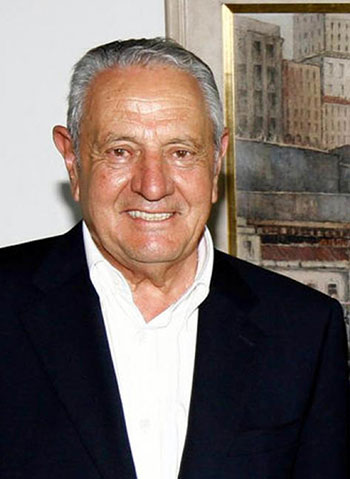
On that occasion, agreements were signed, also, to grant scholarships in the European Union for preparation of tourism personnel linked for the most part with Amorim Group’s businesses, especially with the French hotel chain Accor. Accor started in Cuba in the late 1990s, brought to the island by Americo Amorim himself. Today, it has around 10 hotels in Cuba, which include the luxurious Paseo del Prado, in Havana. Some sources, like those quoted by Belen Balanya in her book Europa S.A.: la influencia de las multinacionales en la construcción de la UE (Icaria Press, page 290), attribute to Amorim participation in up to 40 hotel installations in Cuba.
What’s interesting about the agreement signed in 2017 by Paolo Titolo about financing the training of hotel personnel is that it definitely reminds us of similar schemes during the 1980s that led the European Union to accuse Americo Amorim of fraud.
According to information provided by the Portuguese daily Publico, in 2000, this businessman friend of the Castros was accused of falsifying documents, fraud and diversion of money from the European Social Fund. The European Union demanded retroactive indemnification going back to 1987, based on the fraudulent use of money for “professional training” between 1985 and 1988. Among the irregularities that were detected was the fact that money did not go to young professionals because the scholarships were fake.
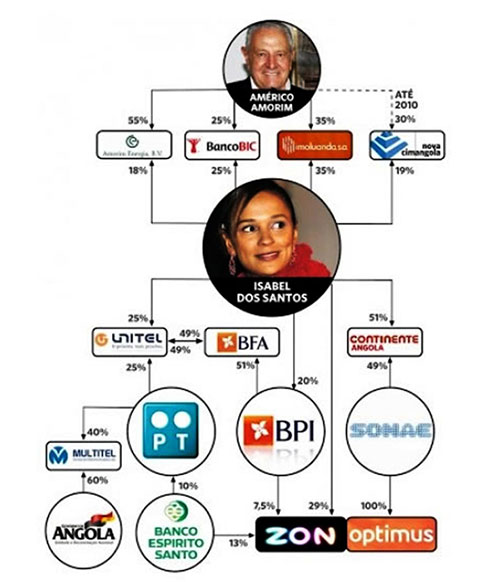
As to the lumber business, which Grupo Amorim has led globally dominating more than 30% of the world market, even with no ownership of timber forests in Portugal, it is possible to affirm that in 2019 there were Cubans – workers, technical personnel and forest engineers- as “contracted collaborators” in Amorim’s Cabinda sawmills in Angola. This, according to information derived from a scientific research conducted aimed at raising the company’s productivity. Isabel dos Santos was a stockholder in Amorim Cabinda.
The study was published in the January-April 2020 issue of Revista Cubana de Ciencias Forestales. It is titled “Analisis de la calidad del aserrado de maderas tropicales en Cabinda, Angola” (An analysis of tropical lumber processing in Cabinda, Angola). It was conducted by two Cuban engineers: Daniel Alvarez Lazo, from the University of Pinar del Rio, and Solange Silva Fuentes, from Empresa Agroforestal Matanzas, together with specialists from Angola and Ecuador.
It’s a repeated mistake to affirm that Paolo Titolo came to Cuba with the Amorim Group, a confusion that the Castros have not bothered to correct because maybe it’s to their convenience in that it fosters the prevalent ignorance about the real relationship between Americo Amorim, who died in July 2017, and Fidel Castro. And later on, with Raul, when the older brother starts to pass down the reins of power.
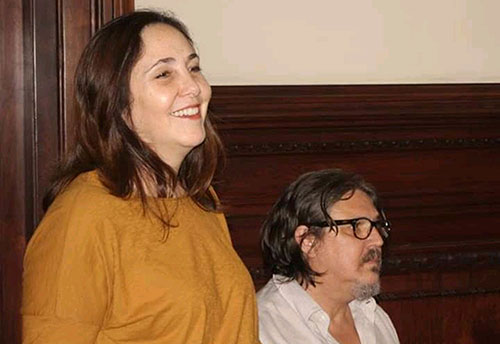
When the Amorim Group arrived in Cuba in the 1980s, its general director in Havana was the Portuguese Jose Guimaraes. It’s not until 2004, as Paolo Titolo himself states in his LinkedIn introduction, that the Italian joins the Cuban representation and starts to learn the ins and outs of the business and to get ready for replacing old man Guimaraes (who enjoyed the trust of both Americo and Fidel). This maneuver was arranged by Raul Castro himself during his visit to Portugal in 2005. It would be good to remember that it was after this trip that the expulsion of foreign businessmen from Cuba started, probably intended to make room for Amorim Group’s expansion.
Coincidentally, it was also in 2005 that Angola’s International Credit Bank was founded with the collaboration of Isabel dos Santos. Through ICB, hundreds of millions of US$ were laundered, until 2014, the year Americo sold his stock to “the African princess”.
The press covered that meeting between Americo Amorim and Raul Castro, reported the latter’s tour of the millionaire’s companies at Villa de Feria. There also is evidence of similar visits by Fidel Castro, the first on in 1998, on the occasion of the Ibero American Summit, held in Oporto. The Cuban dictator and his good friend Americo are together in dozens of photographs taken at that time, used by both men to consolidate old agreements from the Soviet era which today include other Amorim-related companies, such as Engimov Construcciones S.A. and Engimov Real Estate, both of them with rep offices in Cuba’s Mariel Special Development Zone under the name Engimov Caribe S.A.
All these companies are acknowledged by the Cuban Chamber of Commerce, and are directed by the Castros through the Italian general manager, Paolo Titolo. Titolo is an engineer who graduated in Palermo, who loves to travel around the world and take photographs. But most of all, he had the tremendous good fortune of marrying Mariela Castro Espin on December 26, 1998 and joining Cuba’s “royal family”. That clan would place him at the head of all the businesses that Americo Amorim had with the only communist survivors from “the good old days”, the days of timber contraband and workers’ exploitation passing for “volunteer work” at factories and sawmills.
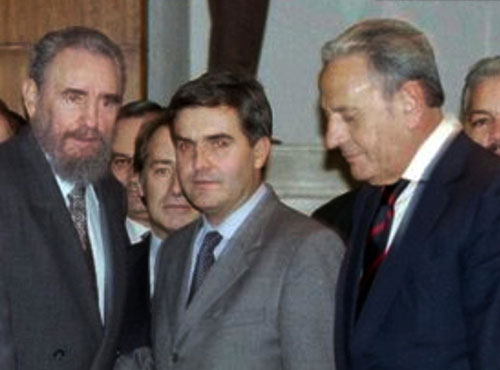
The opening of factories in communist countries during the 1980s was the way that Americo Amorim found to influence the communist bloc’s five-year–plan designs, as he admitted in a 2003 interview for Fortuna & Negocios magazine. In exchange, the Soviets gained, through Amorim’s influence, the necessary support to introduce bloc diplomats in Portugal and the rest of the European countries.
In addition, it was Americo Amorim –at the request of Fidel Castro- that convinced Paolo Portas, vice president of the Portuguese Chamber of Commerce, to lead a mission of Portuguese businessmen to Cuba in 1998. That is the year that, according to Belen Balanya in her book Europa S.A.: la influencia de las multinacionales en la construccion de la UE, Americo Amorim saw himself involved in another scandal, in collusion with the Portuguese government, for having influenced the hiring of business leaders for high public posts in the country’s government. By this time, Amorim was already investing in several hotels in Cuba.
Amorim’s businesses did not stop with the fall of the Berlin Wall or with Fidel Castro’s illness. They continued with Raul based on the 2005 agreement. It’s that year that, according to the Portuguese daily Observador, Americo Amorim starred in what, until today, has been one of the largest business deals ever made by a Portuguese businessman. He recovered and brought under national control the Galp Energia company (where Isabel dos Santos was also a stakeholder), thanks to a discovery of oil in deep waters.
This is also the time that oil is making millions for the Castros. In 2000, under the Comprehensive Cooperation Agreement, Hugo Chavez begins to send to Cuba 53,000 cubic meters (m3) of crude oil, while in Angola, fossil fuel will also multiply the wealth of Jose Eduardo dos Santos’ daughter.
It was in 2005 that Venezuela upped its oil shipments to Cuba to 92,000 m3 per day, which accounted for 3.5 % of Petroleos de Venezuela S.A. (PDVSA)’s daily production. Cuba would then export –there is no certainty as to whom- a surplus of 40,000 to 50,000 m3 per day; Cuba’s total consumption was around 120,000 m3 per day, and the island produced around 80,000.
For now, one cannot ascertain that there is a direct relationship between the Cuba-Venezuela deal and what was happening in the oil market in those years, but, according to an article from July 2010 in Portugal’s daily Esquerda, Americo Amorim was the wealthiest man in Portugal in 2009, his wealth having grown by 9.1%. Coincidentally, this is the year that Raul Castro formally inherits the reins of power in Cuba.

The image of Sandro Castro driving a Mercedes Benz in a communist country where poverty is found everywhere, in undeniably scandalous. Tony Castro’s photographs taken while sunbathing aboard his yacht or while vacationing in Paris are equally offensive. As offensive as are those of Guillermo Garcia Frias’ grandson on his European honeymoon with his bride, while his grandfather-comandante tells Cubans they should eat ostriches and banana rats to satiate their hunger. The empire in the shadows that the favorite grandsons of the dictatorship probably will inherit will make the eccentric antics of the other grandchildren seem like child play.
ncG1vNJzZmirY2OytnnCnqWtqpGhenJ6wKaYs6eelsS0esKopGippae2trmOnKybmZ6awW%2B70aBmnqaXoba0tIyrmK6kXZiutMDRqKpmn6KWu6Wvx6KjnaqVo3qiusNmqZ6kkam2t7HSZquhnV2kwamx0WapqKykmrturc%2Bpo56rXZ67bsDHnmSbmaKnsq16x62kpQ%3D%3D